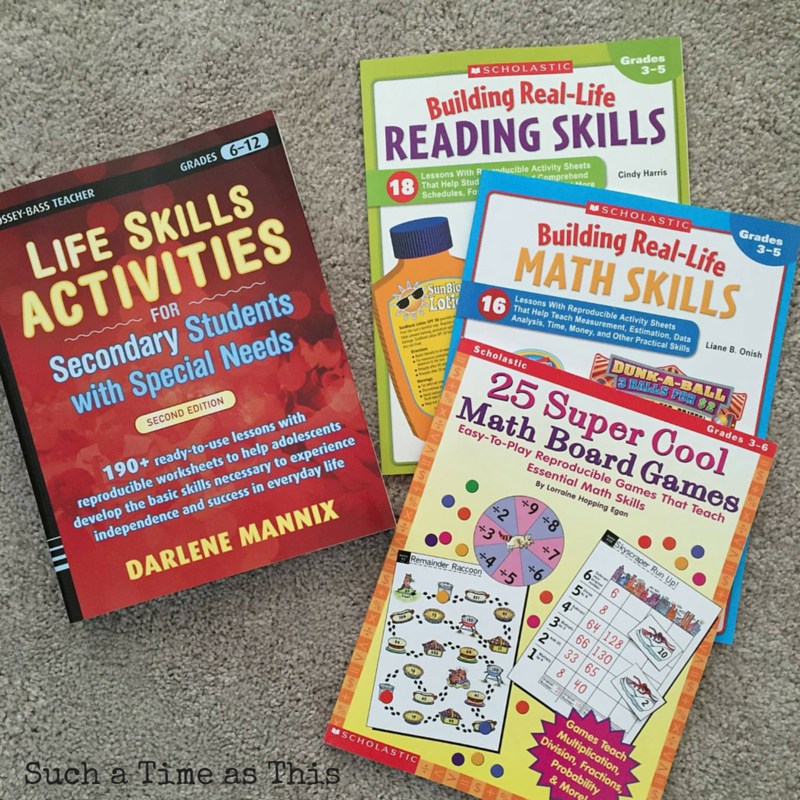Contains affiliate links. Please see my disclosure policy.
Strategies for Homeschooling a
Special Needs Middle Schooler
This post contains affiliate links. Please see my disclosure policy.
I’ve hesitated to write too much on how to homeschool a child with autism because each child is so different. I know that every child is unique – but the autism spectrum brings upon its own version of this dynamic. It’s uniquely unique There are kids who are high functioning and low functioning. There are kids who have high academic success rates and there are kids who have a cognitive delay. For the purpose of this article, I want to focus on how to teach kids who have developmental delays, including cognitive impairment. I want to encourage you that special needs homeschooling can be done – and done well – with the right tools.
If you are new to homeschooling, first I want to say “Welcome.” You can do this because you are your child’s best advocate. You care about your child, you love them, and you know them. The thing I’m realizing about special needs homeschooling and having a special needs middle schooler is that now is the time to start focusing on the future. There are gaps in my child’s learning and understanding and my goal for the next few years is to push him, to challenge him, and to try my best to get him where he needs to be so that he can have a fulfilling life.
Questions to ask as you aim to get started: Special Needs Homeschooling
What are your child’s strengths and weaknesses?
Does your child love one particular subject? What do they excel at academically? My son loves math and while he does fine at reading he doesn’t enjoy it as much as he does math. Some subjects might need to be presented in a different way for them to grasp it if they struggle with it.
What level are they working at academically?
If you are unsure of what level your child is working on, you might choose to get an outside assessment. There are some online tests that assess reading level or math comprehension level. The goal is to challenge your child without overwhelming him.
What are the life skill gaps?
These are skills that they might need to know now, but moreover, they are working toward a specific goal. Kitchen skills might include preparing a snack or even a meal, putting dishes in the sink or loading the dishwasher. These are skills that build off of each other. They might include picking up their own school material and putting it away in a cabinet, wiping their sink, mopping, or vacuuming. Figure out where they are and create a map of the life skills they have already worked on and what they are currently working on. I tend to work on life skills 1-2x a week at this point because he is at a maintenance mode with so many. I want to keep moving forward but don’t stress it every day.
Do they have self-care skills?
Assess your child’s level of self-care skills, which for some might be considered life skills. I tend to think of them somewhat differently. This is something they need to work on every day like brushing their teeth, hair, showering, dressing, putting on deodorant, picking out appropriate clothing, actually getting dressed, putting on shoes, and tying shoes. It might even include buckling them in the car or opening and shutting the car door. We work on these skills every day.
What would make a great reward?
If your child needs shorter work times, figure out a good source of “fun” that could be used in his downtime between work periods. This might be an app on your iPad, it might be a song, a video clip (5 min or less), or a board game you play with him for a few minutes. Some people do use food as a reward but I hesitate to do this in our home.
How is their behavior?
If your child is expressing unwanted behavior you should look at what the cause could be. Sometimes problem behavior emerges when my son is bored, overstimulated, not understanding the subject matter, or when he is flat out seeking attention. We have gone through times of problem behaviors, but the best thing in our case was finding an angle that makes learning enjoyable for my son. Always give options – I ask him to pick between two start times for a particular subject. We are using some fun material that feels more like a game than “work” and he is motivated to keep playing with no breaks because he doesn’t realize he is doing “work”.
Do they qualify for any services?
Whether through the public school, the state, or privately – your child might qualify for services. ABA, physical, OT, speech
- Find opportunities for practicing social skills and other life skills.
Plan trips and outings (library, restaurants, fast food, grocery store, fire station, zoo, post office, pet store, big box stores, parks…) Find ways that your child can practice and learn through doing.
- Make a plan to increasing life skills and social skills
Jot it down in a notebook or Print our Life Skills Worksheet.
- Collect books which will help with functional skills
I recently bought Life Skill Activities for Secondary Students with Special Needs, Building Real Life Reading Skills, 25 Super Cool Math Board Games, and Comprehending Functional Text .

Remember that your homeschool doesn’t have to look like everybody else’s … it needs to be effective for YOUR child to learn in the best environment with the best tools available!
What tips do you have for special needs homeschooling?
Ready for more homeschooling tips? Check out these awesome bloggers:
Kym @ Homeschool Coffee Break
Latonya @ Joy in the Ordinary
Laura @ Day by Day in Our World
Leah @ As We Walk Along the Road
Lisa @ Farm Fresh Adventures
Lori @ At Home: where life happens
Meg @ Adventures with Jude
Megan @ My Full Heart
Melanie (Wren) @ finchnwren
Melissa @ Mom’s Plans
